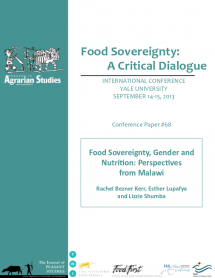Ideas into movement
Boost TNI's work
50 years. Hundreds of social struggles. Countless ideas turned into movement.
Support us as we celebrate our 50th anniversary in 2024.


Issues of gender inequality and undernutrition are not always raised in discussions of food sovereignty. While La Via Campesina has noted the centrality of gender equality for achieving food sovereignty, including a recent discussion to mark the 20th anniversary of the concept, much of the advocacy and focus of those groups promoting food sovereignty has been on other large-scale political and economic factors that influence farmers’ potential to produce food themselves, such as land grabs, climate change or international trade agreements.
Despite important statements about gender equality, and attention to the ways in which peasant organizations are organized, there is less emphasis in food sovereignty literature on the myriad of ways in which gender inequality works against achieving food sovereignty at the household level, or how such inequality can work against improving child nutrition.
In addition, much of the discussion about food sovereignty remains at the theoretical level, with little empirical research on linkages between food sovereignty approaches and outcomes for smallholder households’ livelihood, health and wellbeing. In the nutrition literature there is ample attention to gender at the household level, and a plethora of empirical research on different nutrition educational approaches, but little attention to political and economic factors that influence child nutritional outcomes.
This paper will examine the commonalities between the concept of food sovereignty and gender inequality through the lens of a farmer-to-farmer agroecology project in Malawi. We draw on over a decade of experience of smallholder farmers’ efforts to use agroecological methods to improve food security, nutrition and land quality, using farmerto-farmer educational methods.
Our focus on child nutrition improvements led to increased attention to inequalities in decision-making and labour at the household and community level, and we developed several innovative educational strategies to address these inequalities. Many of these strategies focused on dialogue and problem-solving and drew on local concepts of traditional leadership and knowledge to foster change.
We also paid attention to particular inequalities such as those experienced by youth or people infected with HIV/AIDS. Discussions about food sovereignty, or broader global patterns of international trade often seemed much more abstract to farmers struggling with food insecurity, HIV and child survival. Advocates of a food sovereignty approach in places like Malawi need to ground the discussion in the daily lived realities of smallholder farming families, including the difficult and complex issues related to gender, child nutrition and HIV.
More empirical research and evidence is needed to provide greater substance to the arguments being made at the international level.
Rachel Bezner Kerr, Associate Professor in Development Sociology Rachel Bezner Kerr’s research interests converge on the broad themes of sustainable agriculture, food security, health, nutrition and social inequalities, with a primary focus in southern Africa. She has worked with a long term, interdisciplinary, participatory research project in Malawi that has aimed to improve nutrition, food security and land quality using agroecological methods.
Esther Lupafya, AIDS Coordinator and Deputy Director of Primary Health Care of Ekwendeni Hospital Esther Lupafya is a community nurse and holds an M.A. in Social Development and Health from Queen Margaret University (Scotland). She has held her positions at Ekwendeni Hospital for over a decade. Lizzie Shumba Soils, Food, and Healthy Community project, Ekwendeni Malawi
Lizzie Shumba has been working with the Soils, Food, and Healthy Community project in Ekwendeni Malawi since 2005. She has co-authored five papers on health, agriculture, and nutrition in Malawi and has presented at conferences in Malawi, the UK, and Mexico. Lizzie holds a diploma in nutrition, and a Certificate of Principles and Practice in Farm Home Science, both from Natural Resources College, Lilongwe, Malawi.
Food Sovereignty: a critical dialogue, 14 - 15 September, New Haven.